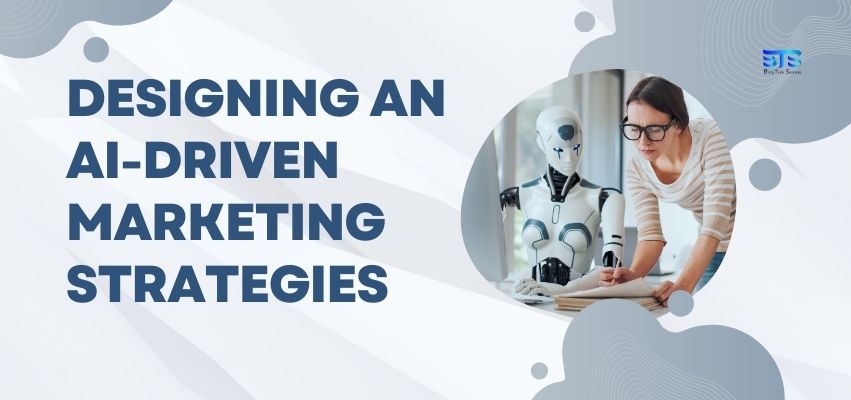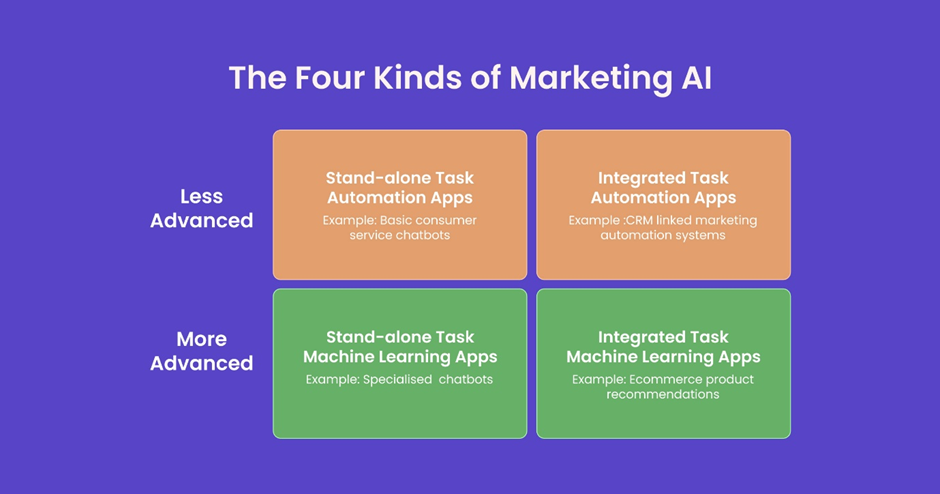
How to Design an effective AI-Driven Marketing Strategies
Learn simple, effective AI strategies to boost your marketing, streamline campaigns, and drive growth. Perfect for marketers seeking actionable, easy-to-implement tips.
Artificial Intelligence (AI) is revolutionizing the marketing industry, offering tools that enhance efficiency, personalization, and data-driven decision-making in business. To get these benefits, businesses or firms must design a comprehensive AI-driven marketing strategy.
As per sources, AI adoption has increased by 27% over the past year and a half, according to a survey conducted by the American Marketing Association. Additionally, three of the top five AI goals were marketing-focused, according to a Deloitte global survey of early AI adopters, like improving current products and services, developing new products and services, and strengthening customer relationships.
How AI Is Changing Marketing
With the ultimate goal of increasing the efficacy of marketing initiatives, an AI marketing strategy makes use of artificial intelligence technology to enhance or automate a range of marketing operations, including generating content, anticipating trends, and evaluating customer data. Although generative AI in marketing is possibly the most obvious application, there are many more ways AI may help and advance marketing initiatives.
Two dimensions—less advanced and more advanced—can be used to further divide marketing AI into four primary types, depending on the degree of intelligence and whether it is a standalone solution or a component of a larger framework.

As we can see, there are a lot of different applications. Marketers can create the most successful marketing plan and select the apps that best meet their needs by having a thorough understanding of these sections. Step-by-Step Guide to Designing an AI-Powered Marketing Strategy
Step-by-Step Guide to Designing an AI-Powered Marketing Strategy
1. Define Marketing Goals
Begin by identifying the primary business objectives. Whether it is increasing sales, enhancing brand awareness, or improving customer retention, the clear goals provide direction for the AI initiatives.
For instance, if the aim is to boost online sales by 20% within a year, AI can assist in identifying and targeting potential customers more effectively.
2. Understand Your Audience
Utilize AI-powered tools to conduct thorough market research and analyze customer behavior. AI can process vast amounts of data to reveal insights into customer preferences and enable effective segmentation and personalized marketing efforts.
For instance, an e-commerce platform can use AI to track browsing habits, identifying that customers in a certain age group prefer specific product categories, allowing for more targeted promotions.
3. AI for Data Analysis
Finding patterns and trends in large datasets is an area in which artificial intelligence is good. You can find practical insights that guide strategy development and decision-making by incorporating AI into your data analysis procedures.
AI excels at identifying trends in large datasets. A business analyzing customer reviews may use AI-driven sentiment analysis to discover a rising demand for eco-friendly packaging, guiding product development and marketing strategies.
4. Select the Right AI Technologies
Choose AI tools that align with your marketing objectives. Options range from chatbots for customer service to AI-driven analytics platforms for data interpretation. Ensuring these tools integrate seamlessly with existing systems is important for maximizing their potential.
- Chatbots & Virtual Assistants: Enhance customer service and engagement.
- Predictive Analytics: Forecast customer behavior and optimize marketing efforts.
- Personalization Engines: Deliver tailored content and product recommendations.
- Automated Content Creation: Generate relevant and high-performing marketing copy.
- Sentiment Analysis: Assess consumer perceptions of the brand.
5. Integrate AI into Existing Systems
For AI to be effective, it must work in balance with your current marketing infrastructure. This integration facilitates streamlined operations and ensures that AI initiatives enhance rather than disrupt existing workflows.
For example, a retail business integrating AI into its CRM system can automate follow-up emails based on past customer interactions and improve retention efforts.
6. Develop AI-Driven Campaigns
With artificial intelligence, you can create personalized marketing campaigns that work with individual customers. Therefore, AI enables the delivery of custom-made content, product recommendations, and targeted promotions, enhancing customer engagement and conversion rates.
For instance, a travel agency might use AI to suggest vacation packages tailored to a customer’s past booking history and preferences, leading to higher conversion rates.
7. Test and Optimize
Implement A/B testing and use AI to analyze the results, and allow for continuous optimization of marketing strategies. This process ensures that campaigns remain effective and adapt to changing market dynamics.
For example, a fashion retailer might test two different email subject lines, which allows AI to determine which one drives higher open rates and adjust future campaigns accordingly. See how our services can help you launch personalized campaigns.
8. Continuous Learning
The field of AI is changing quickly. Keep up with the latest developments in AI by updating the knowledge and modifying strategies on a regular basis to keep the advertising strategies innovative.
For example, a digital marketing team regularly adopting new AI tools can refine its ad targeting strategies based on the latest machine-learning models.
9. Ethical Considerations
Implement AI responsibly by ensuring compliance with data privacy regulations and maintaining transparency in AI-driven interactions. And building trust with your audience is essential for long-term success.
10. Training and Development
Give your staff the skills they need to effectively use AI tools. Your staff will be able to fully utilize AI's potential with ongoing training, which will encourage their innovation and productivity.
Empowering employees to use AI effectively is key. A marketing department conducting regular AI training workshops ensures that staff can learn automation tools to enhance creativity and productivity.
11. Measure and Report
Utilize AI to monitor key performance indicators (KPIs) and generate reports. This data-driven approach allows for informed decision-making and demonstrates the ROI of AI initiatives.
For example, a SaaS company might use AI-driven dashboards to analyze user engagement metrics, demonstrating the impact of marketing efforts on subscription growth.
Therefore, by following these steps, businesses or firms can craft an AI-driven marketing strategy that not only enhances operational efficiency but also delivers personalized experiences to customers, fostering growth and competitive advantage.
Takeaways
Artificial Intelligence (AI) is transforming the marketing industry by enabling businesses to enhance efficiency, personalization, and data-driven decision-making. By systematically designing an AI-driven marketing strategy, companies can optimize their campaigns, improve customer engagement, and achieve business objectives. Additionally, businesses must ensure seamless integration of AI tools, continuous learning, ethical compliance, and proper staff training to maximize AI’s potential.
By embracing these strategies, companies can stay ahead in a competitive market, deliver enhanced customer experiences, and achieve sustainable growth. Visit our website for more insights and to start your AI-driven marketing journey today
